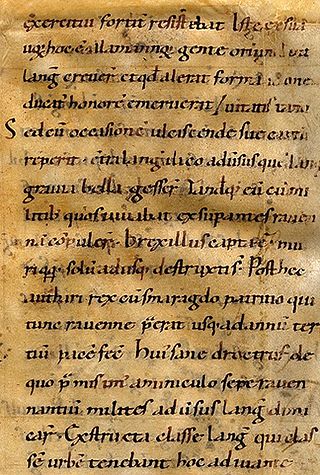Related Research Articles

Paul the Deacon, also known as Paulus Diaconus, Warnefridus, Barnefridus, or Winfridus, and sometimes suffixed Cassinensis, was a Benedictine monk, scribe, and historian of the Lombards.

Smaragdus was Exarch of Ravenna from 585 to 589 and again from 603 to 611.
Callinicus was the exarch of Ravenna from 597 until 602 or 603. He is called Gallicinus, or Gallicini patricii, by the Lombard historian Paul the Deacon.

William Dudley Foulke was an American literary critic, journalist, poet, and reformer.

Agilulf, called the Thuringian and nicknamed Ago, was a duke of Turin and king of the Lombards from 591 until his death.
Rodoald, was a Lombard king of Italy, who succeeded his father Rothari on the throne in 652. He was said to be lecherous and he was assassinated after a reign of just six months in 653 by the husband of one of his lovers. Paul the Deacon writes that Rodoald "had reigned five years and seven days, ", although historians note that this length of reign is suspect. Aripert, a rival claimant, was elected with the support of the Catholic Church, which opposed the Arian monarchy.

The History of the Lombards or the History of the Langobards is the chief work by Paul the Deacon, written in the late 8th century. This incomplete history in six books was written after 787 and at any rate no later than 796, maybe at Montecassino.
Tasso was the joint Duke of Friuli with his younger brother Kakko from their father's death (611) to their own. Their father was Gisulf II and their mother Romilda of Friuli. In or around 611, Gisulf was killed fending off an Avar invasion.
Kakko was the joint duke of Friuli with his elder brother Tasso from their father's death (611) to their own. Their father was Gisulf II and their mother Romilda of Friuli. In or around 611, Gisulf was killed fending off an Avar invasion.

Saint Baudolino was a hermit who lived at the time of the Lombard king Liutprand in Forum Fulvii, a locality on the lower reaches of the river Tanaro in north-west Italy. He is said to have been the son of a noble family, but to have given all his wealth to the poor before moving to a miserable hut near the river. He is the patron saint of the nearby city of Alessandria, where his feast is celebrated on the Sunday following 10 November.
Garibald I was Duke of Bavaria from 555 until 591. He was the head of the Agilolfings, and the ancestor of the Bavarian dynasty that ruled the Kingdom of the Lombards.
Faroald II was the duke of Spoleto from 703, when he succeeded his own father Thrasimund I.
Ago was the Duke of Friuli from between 651 and 661 until about 663. He succeeded Grasulf II.
Arnefrit, Arnefrid, Amefrit, or Amefrith was the son of Lupus of Friuli who claimed the Duchy of Friuli after his father's death in 666.
Wechtar, a Lombard from Vicenza, was the Duke of Friuli from 666 to 678. He took control of Friuli at the command of King Grimoald following the rebellion of Lupus and Arnefrit and the invasion of the Avars. According to Paul the Deacon, he was a mild and fair ruler.
Landar, Landari, or Laudari(s) was the Duke of Friuli following Wechthari in 678. He himself died before 694, when Rodoald appears as his successor.
Rodoald or Rodwald was the Duke of Friuli following Landar in the late seventh century. The precise dates of his reign cannot be known.
Ansfrid, Ansfrit, or Ausfrid was the Duke of Friuli in 694. He was originally the lord of the castle of Ragogna.
Ado was the Duke of Friuli after the usurper Ausfrid was defeated at Verona in 694. According to Paul the Deacon, he was a brother of the former duke Rodoald and ruled for a year and seven months. The actual length of his reign is disputed, as is the year of its occurrence. He appears with the title loci servator (caretaker) and may have only held the duchy as regent on behalf of the king.
Corvulus was the Duke of Friuli for a brief spell in the early eighth century AD. Virtually nothing is known about his origin and life; he replaced Ferdulf, but he apparently offended King Aripert II and was arrested and had his eyes gouged out. He "lived ignominiously" in shame as an obscure, blind exile thereafter, according to Paul the Deacon. He was ultimately replaced by Pemmo.
References
- Paul the Deacon (Paulus Diaconus) (1907), Historia Langobardorum, translated by William Dudley Foulke, University of Pennsylvania